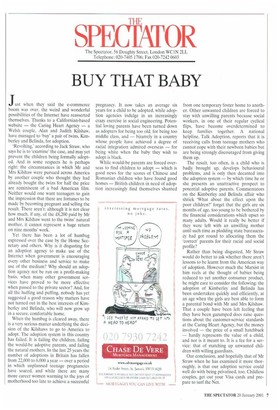BUY THAT BABY J
ust when they said the e-commerce boom was over, the weird and wonderful possibilities of the Internet have reasserted themselves. Thanks to a Californian-based website — the Caring Heart Agency — a Welsh couple, Alan and Judith Kilshaw, have managed to 'buy' a pair of twins, Kimberley and Belinda, for adoption.
'Revolting,' according to Jack Straw, who says he is to 'examine' the case, and may yet prevent the children being formally adopted. And in some respects he is perhaps right: the circumstances in which Mr and Mrs Kilshaw were pursued across America by another couple who thought they had already bought the twins for half the price are reminiscent of a bad American film. Neither would one want teenagers to gain the impression that there are fortunes to be made by becoming pregnant and selling the result. There aren't: although it is not clear how much, if any, of the £8,200 paid by Mr and Mrs Kilshaw went to the twins' natural mother, it cannot represent a huge return on nine months' work.
Yet there has been a lot of humbug expressed over the case by the Home Secretary and others. Why is it disgusting for an adoption agency to make use of the Internet when government is encouraging every other business and service to make use of the medium? Why should an adoption agency not be run on a profit-making basis, when many other government services have proved to be more effective when passed to the private sector? And, for all the huffing and puffing, nobody has yet suggested a good reason why matters have not turned out in the best interests of Kimberley and Belinda, who will now grow up in a secure, comfortable home.
When the humbug is cleared away, there is a very serious matter underlying the decision of the Kilshaws to go to America to adopt. The adoption system in this country has failed. It is failing the children, failing the would-be adoptive parents, and failing the natural mothers. In the last 25 years the number of adoptions in Britain has fallen from 22,000 to 6,000 a year — over a period in which unplanned teenage pregnancies have soared, and while there are many more career women warming to the joys of motherhood too late to achieve a successful pregnancy. It now takes an average six years for a child to be adopted, while adoption agencies indulge in an increasingly crazy exercise in social engineering. Potential loving parents have been turned down as adopters for being too old, for being too middle class, and — bizarrely in a country whose people have achieved a degree of racial integration admired overseas — for being white when the baby they wish to adopt is black.
While would-be parents are forced overseas to find children to adopt — which is good news for the scores of Chinese and Romanian children who have found good homes — British children in need of adoption increasingly find themselves shunted
from one temporary foster home to another. Other unwanted children are forced to stay with unwilling parents because social workers, in one of their regular cyclical flips, have become overdetermined to keep families together. A national helpline, Talk Adoption, reports that it is receiving calls from teenage mothers who cannot cope with their newborn babies but are being strongly discouraged from giving them up.
The result, too often, is a child who is badly brought up, develops behavioural problems, and is only then decanted into the adoption system — by which time he or she presents an unattractive prospect to potential adoptive parents. Commentators on the Kimberley and Belinda affair who shriek 'What about the effect upon the poor children?' forget that the girls are six months of age, too young to be bothered by the financial considerations which upset so many adults. Would it really be better if they were left with an unwilling mother until such time as plodding state bureaucracy had got round to allocating them the 'correct' parents for their racial and social profile?
Rather than being disgusted. Mr Straw would do better to ask whether there aren't lessons to be learnt from the American way of adoption. However much the Marxist in him reels at the thought of babies being reduced to yet another consumer product, he might care to consider the following: the adoption of Kimberley and Belinda has been undertaken quickly and efficiently, at an age when the girls are best able to form a parental bond with Mr and Mrs Kilshaw. That a couple have been left feeling that they have been gazumped does raise questions about the customer-service standards at the Caring Heart Agency, but the money involved — the price of a small hatchback — hardly represents the value of a child, and nor is it meant to. It is a fee for a service: that of matching up unwanted children with willing guardians.
Our conclusion, and hopefully that of Mr Straw when he has examined it more thoroughly, is that our adoption service could well do with being privatised, too. Childless couples, get out your Visa cards and prepare to surf the Net.






























































 Previous page
Previous page